Hello Junkies!
Today, you’ll learn some Japanese proverbs and idioms. For previous ones, read Part 5 here.
Today we’re learning the top 10 yojijukugo. What’s a yojijukugo? It’s a four character idiom. In other words, it’s a popular saying and it only consists of 4 kanji characters. No hiragana. No katakana.
How do you use yojijukugo? Use it as a phrase. Just say it. It’s not a verb, adjective, noun or particle. It’s a saying/idiom you say when the context is right. And the good news is, most Japanese learners don’t know these. So, if you use them, you’ll sound like a pro.They also make for good Japanese tattoo phrases.
So, let’s look at some.
1. 頑固一徹 Stubborn. Sticking to one’s views or decisions.
Need a creative way to call someone stubborn? Someone that sticks to their rock-solid beliefs? Then this the idiom you can say when they refuse to bend their thick-headed skull.
- 頑固一徹
- がんこいってつ
- Ganko ittetsu
Ganko means stubborn and ittetsu pretty much means the same thing (stubborn, inflexible.)
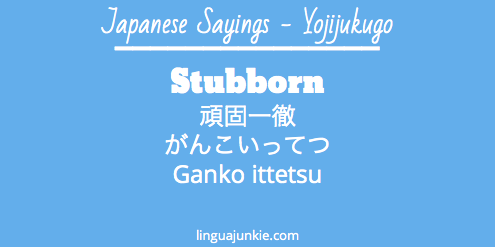
2.一期一会 Treasure every encounter, for it will never recur.
Literally, it means – one time, one meeting. This idiom pretty much means “once in a lifetime encounter” that will never happen. The idiom carries the meaning that you must treasure that meeting.
- 一期一会
- いちごいちえ
- Ichigo ichie
Ichigo means “lifetime” and ichie is one meeting.
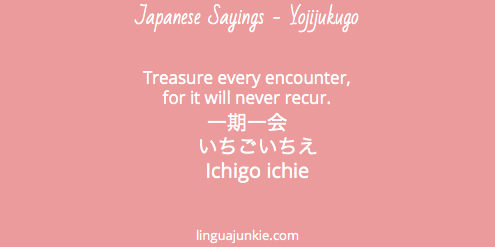
3. 起死回生Revived from the Dead, Recovered From a Hopeless Situation
Can you think of a situation like that? Like, when you didn’t study for a test and walked into a class. That’s walking into a hopeless situation. And then you miraculously pass the test? That’s a recovery! Or think sports.
- 起死回生
- きしかいせい
- Kishi kaisei
Kishin means “saving from the brink of death” and Kaisei means resurrection.
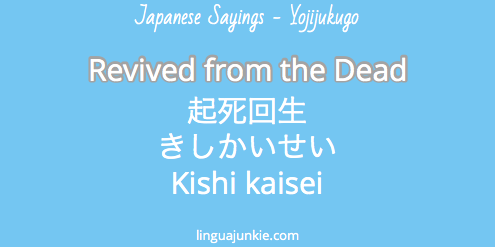
4. 以心伝心 Telepathy, Tacit Understanding
It’s when you look at your friend. They look at you. Both of you are thinking the same thing. Or, when you and a stranger spot something funny and notice each other noticing it. Like telepathy.
- 以心伝心
- いしんでんしん
- Ishindenshin
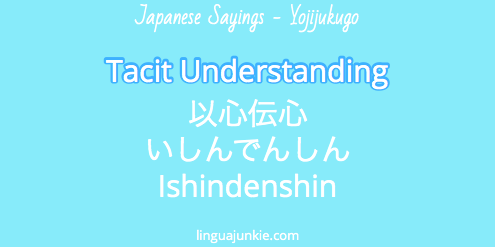
5. 疑心暗鬼 A doubtful mind creates devils in the dark
In other words, jumping at shadows. Once you get paranoid about something, every little thing will scare you. This idiom refers to how a doubtful or suspicious mind – that’s looking for what it’s scared of – will see it everywhere, even if it’s not there.
- 疑心暗鬼
- ぎしんあんき
- Gishin anki
Gishin is doubt or fear and anki is a combination of 暗 (an – darkness) and 鬼 (ki – demon).
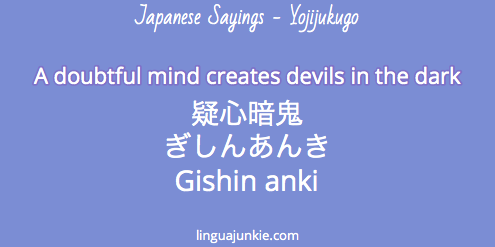
6. 傍若無人 Arrogance, Audacity
See someone being arrogant? Audacious? This is the idiom to call them.
- 傍若無人
- ぼうじゃくぶじん
- Boujauku bujin
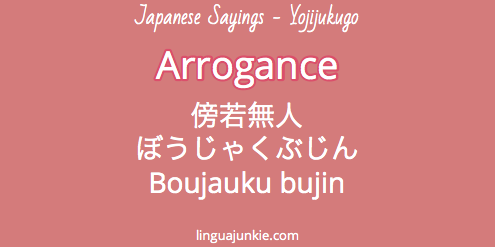
7. 試行錯誤 Trial and error
That’s how you learn. You make mistakes in Japanese. You learn. Someone points at your messups? Well, trial and error. Good idiom to use in the process of learning.
- 試行錯誤
- しこうさくご
- Shikousakugo
Shikou means “making an attempt” and sakugo means mistake or error.
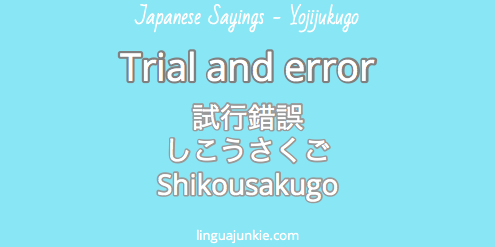
8. 四方八方 In all directions
Know someone that’s scattered all over the place? The want to learn Japanese. They want to learn Korean. They want to be a model. Oh, and they’re planning to be a millionaire. Great idiom for people that are scattered in all directions (and get nothing substantial done.)
- 四方八方
- しほうはっぽう
- Shihou happou
Shihou means every direction and happou is “all sides”.
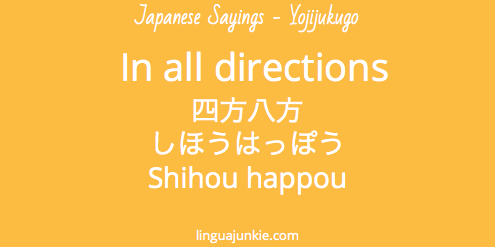
9. 感慨無量 To feel a lump in one’s throat
See your crush? Or perhaps did you screw something up and all of your emotions are coming up all at one – right up to your throat? There’s a Japanese idiom for this. Ah, the good ol’ lump in the throat.
- 感慨無量
- かんがいむりょう
- Kangai muryou
Kangai means strong emotion and muryou means immeasurable.
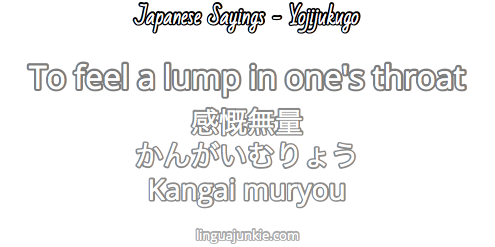
10. 暗中模索 Groping in the dark
Or… stabbing in the dark. This is pretty much means “exploring new avenues without having a clue.”
- 暗中模索
- あんちゅうもさく
- Anchuumosaku
Anchuu means “in the dark.” And mosaku, of course, means “groping.”
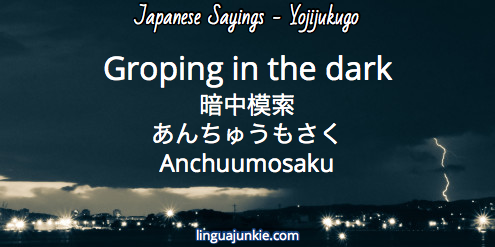
Source: This list was made with the help of JapanesePod101 lessons.
And that’s it!
What are your favorite Japanese yojijukugo?
Do you know of any more?
What else belongs on this list? I’ll read all of your answers.
Leave me a comment below!
– The Main Junkie
P.S. I highly recommend this – if you REALLY want to learn to Japanese with effective lessons by real teachers – Sign up for free at JapanesePod101 (click here) and start learning!
